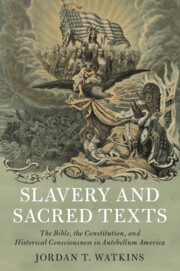 Slavery and Sacred Texts
Slavery and Sacred Texts Book contents
- Slavery and Sacred Texts
- Cambridge Historical Studies in American Law and Society
- Slavery and Sacred Texts
- Copyright page
- Dedication
- Contents
- Acknowledgments
- Prologue
- Introduction
- 1 “Recourse Must Be Had to the History of Those Times”
- 2 “The Ground Will Shake”
- 3 “Texts … Designed for Local and Temporary Use”
- 4 “The Further We Recede from the Birth of the Constitution”
- 5 “The Culture of Cotton Has Healed Its Deadly Wound”
- 6 “Times Now Are Not as They Were”
- 7 “We Have to Do Not … with the Past, but the Living Present”
- 8 A “Modern Crispus Attucks”
- Conclusion
- Epilogue
- Index
4 - “The Further We Recede from the Birth of the Constitution”
Published online by Cambridge University Press: 12 June 2021
- Slavery and Sacred Texts
- Cambridge Historical Studies in American Law and Society
- Slavery and Sacred Texts
- Copyright page
- Dedication
- Contents
- Acknowledgments
- Prologue
- Introduction
- 1 “Recourse Must Be Had to the History of Those Times”
- 2 “The Ground Will Shake”
- 3 “Texts … Designed for Local and Temporary Use”
- 4 “The Further We Recede from the Birth of the Constitution”
- 5 “The Culture of Cotton Has Healed Its Deadly Wound”
- 6 “Times Now Are Not as They Were”
- 7 “We Have to Do Not … with the Past, but the Living Present”
- 8 A “Modern Crispus Attucks”
- Conclusion
- Epilogue
- Index
Summary
This chapter shifts the focus to the Constitution by tracking the emergence of historical readings of the Constitution and showing how debates over slavery drew attention to the historical realities of change since and distance from the founding era. The very act of producing a written constitution initiated this development. At first, the move to see the new Constitution as archival contributed to its status as a sacred document, but that move also had the potential to rapidly desacralize the Constitution by revealing that its roots rested in a distinct temporal setting. The death of James Madison in 1836 sparked efforts to publish and use his writings to interpret the Constitution. The slavery debates shaped that usage. Some abolitionists followed William Lloyd Garrison in using Madison’s Papers to damn the Constitution, but many antislavery constitutionalists advanced interpretations that emphasized the framers’ anticipation of eventual emancipation. Coupled with a stress on slavery’s unexpected spread and the sudden rise of the Slave Power, these antislavery accounts of original expectation cultivated a new sense of temporal dislocation from America’s most useful past.
Keywords
- Type
- Chapter
- Information
- Slavery and Sacred TextsThe Bible, the Constitution, and Historical Consciousness in Antebellum America, pp. 134 - 182Publisher: Cambridge University PressPrint publication year: 2021


